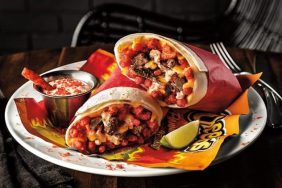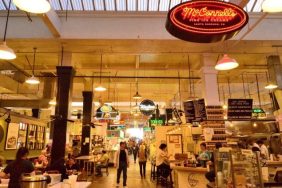It’s late. You’re walking through Madrid after clubbing it up. You may have had a few too many drinks. Something savory, salty, and greasy would really hit the spot. And then you see it: a food cart with a huge hunk of meat, roasting as it spins vertically on a spit, its juices dripping, caramelizing into a crispy crust. This succulent treasure is döner kebab, a Turkish street food, and it’s the inspiration behind Spitz, a rapidly-growing casual restaurant concept with an artsy, edgy ambiance.

Robert Wicklund (L) and Bryce Rademan (R), Spitz co-founders.
“Lunch or dinner at Spitz is an experience,” says co-founder Robert Wicklund. He started the business with Bryce Rademan a decade ago and has since opened seven locations, with an eighth on the way.
Spitz specializes in two varieties of döner kebabs (chicken or beef with lamb), shaved into tender, paper-thin strips and served in sandwiches, wraps, and atop salads with house-made sauces. The ever-evolving menu also includes Döquitos (a Mediterranean version of the Mexican taquito) and the food truck-inspired Street Cart Fries, loaded with an addictive combination of garlic aioli, feta cheese, onion, green pepper, tomato, olives, and pepperoncinis.

Street Cart Fries
The idea for this deliciousness began shortly after Wicklund and Rademan met while living in the same dorm their freshman year at Occidental College in Los Angeles. In their junior year, they spent a semester abroad and discovered döner Kebab, ubiquitous in Europe.
“It’s the perfect food for college students out late to soak up all that alcohol at the end of the night,” Wicklund says. The friends fell in love with the flavor and upon their return to the States, they began plotting to bring it to California. After writing a business plan and approaching family for investment funds, they signed a lease on a “little shoebox” in Eagle Rock. Ten months of building later, in 2006, they opened Spitz’s first location.
Both founders were only 23 years old at the time. “To be that young and inexperienced was, in some ways, a great asset,” Wicklund says. “You could work those nineteen-hour days, six days a week, and survive. You have the complete and total confidence of a person in their early twenties, where you think everything is going to work out for you.”
Also: 7 Must-Follow Doughnut Shops on Instagram
Rademan had some kitchen experience, but Wicklund learned on the go. The buddies’ college education hadn’t exactly prepared them to run a restaurant: Rademan had a degree in diplomacy and world affairs while Wicklund was an English major. “I would have had a more applicable experience if I’d been a general manager at Subway for a couple of years,” he says.
The staff totaled two. Rademan and Wicklund served customers, cleaned at night, then prepped all the food for the next day. “I kind of have PTSD from those first couple years because they were so crazy,” Wicklund says with a chuckle. “It was a challenge to figure out how we were going to scale all of that.”
But scale they did. A second location in downtown Los Angeles soon followed. In the time it took to prepare for the opening, however, the economy crashed. Forging ahead in a recession wasn’t ideal, but Spitz fought its way through. As the economy improved, the business regained momentum. Now, Spitz has four locations in Los Angeles, two in Salt Lake City, and a recently-opened restaurant in San Diego. Minneapolis is in the works.

Wicklund says Spitz’s expansion has been organic, taking on partners that are family, friends, or former employees. No outside investment has been needed. “It’s all people who know us and know the brand,” he says. The Salt Lake City partners are high school friends of Rademan. San Diego is run by a longtime general manager of Spitz. Wicklund’s brother-in-law is at the helm in Minneapolis. “Even though we’re having a big year and expansion into new markets, it’s still feeling like a family business,” Wicklund says.
Keep in mind that this all took place before the food truck boom. “If we had opened a couple of years later, it would have been the place to start,” Wicklund admits. “We did the whole thing backwards.” But it’s never too late to join the food truck brigade. As the company celebrates its ten-year anniversary this spring, it has also entered talks to roll out trucks in 2017.
Also: Chef Scott Zwiezen’s Falafel Paradise
Meanwhile, Mediterranean food lovers flock to Spitz and rave about its irresistible menu items on social media. Reviewers on sites like Yelp adore the restaurant’s gritty, graffiti-fueled décor, designed in collaboration with Los Angeles artist Devon Paulson.
Owning a slew of popular restaurants is not where Wicklund and Rademan imagined they’d be way back in the old days of their Occidental College dorm, but as Wicklund points out, “one of the things Occidental was really good at was making you feel you could do anything. I think we’re proof that you can.”








